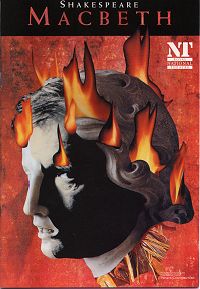
 |
|
Richard Eyre makes his first Macbeth at the National everything you'd expect from the last. Beautifully restrained and almost elegiac, touched by minimalism, expressionism but every now and then blipping the throttle to show the Olivier's horsepower. This happens when initially the three witches, then Macbeth himself in his second encounter with them, perform within a ring of fire. And on the latter occasion, Alan Howard's questing, insecure monarch already seems to be tasting hell, with a thin veil of smoke twisting around him and curling to the flies. The nub of this Macbeth is motivation. What makes him commit such butchering atrocities? The answer here is twofold. In an age more pagan than god-fearing, he takes the trio of ragbag women's predictions as gospel. Although tentative in the good King Duncan's court and suspicious of easy advancement (Howard doing his mock surprise 'who me?' expression), he already has the air of an Oscar nominee with an inside tip of his win, all brittle smile and dagger eyes. And in his final duel with Macduff he displays the arrogance of immortality, merely going through the motions of self defence, flicking his sword rather than wielding it. |
 |
Anastasia Hille's Lady Macbeth provides the other reason for her husband's Attila attitude. An alabaster blonde in figure-hugging black velvet and 20 years his junior, she has him by the heart, brain and nether regions. He might well want to call it a day when he gets home after weeks at battle, but she caresses his unkindled purpose, arouses his deeper ambitions and stiffens his resolve while continuously plucking his symbolic dagger from its sheath. We're left in no doubt as to what makes this Macbeth tick.
Howard is marvellous in his almost schizoid mood swings - philosophical on the battlements of Bob Crowley's high timber fortress as he reaches into black night for the dagger he sees before him, or barking mad when Banquo's ghost rises from the ground leaving a stencilled body profile to usurp his place at the banquet table. Howard is not best known for his body language or histrionics, but as the Macbeths rinse blood from their hands kneeling before a cold tub he lets fly a high-pitched warble heralding a descent into hell that chills the audience.
Howard is magnificently supported by Hille and Robin Bailey's Duncan, but nowhere better than in James Laurenson's Macduff whose white-suited diplomat cajoling Malcolm to action visibly ossifies with grief on hearing of his family's slaughter.
Eyre spares us the sight of Birnam Wood moving in on Dunsinane, allowing subtlety to prevail instead on Bob Crowley's sets of large sliding walls and occasional blood red drapes, while Dominic Muldowney's music unobtrusively enhances the tumble of scenes. A great Macbeth.
Graham Hassell.
What's On London, 7.4.93.